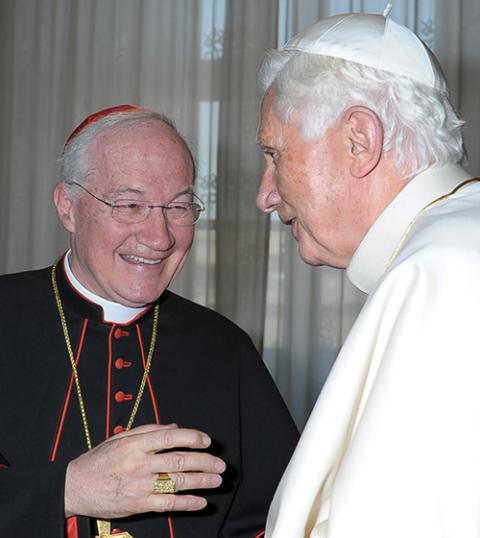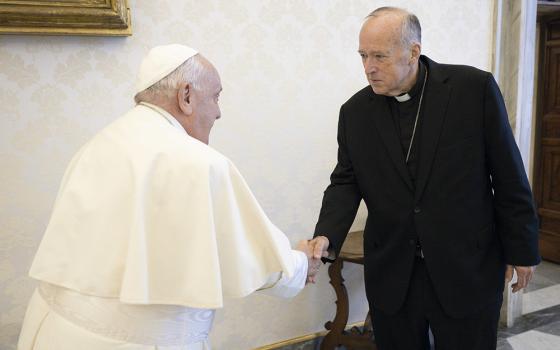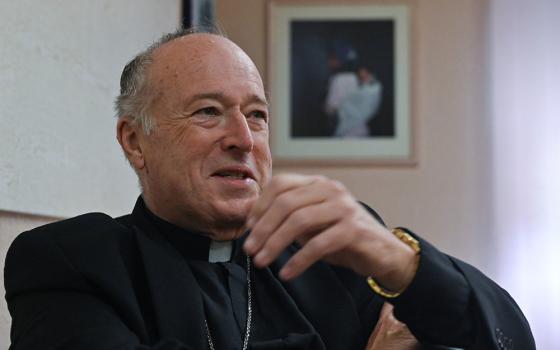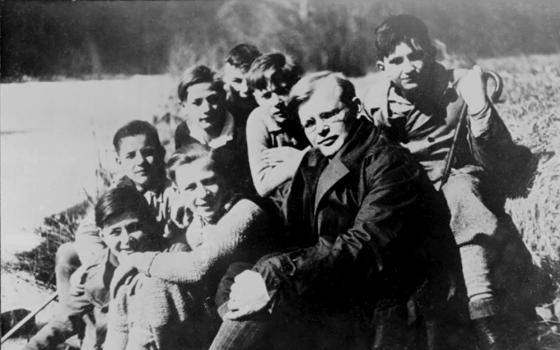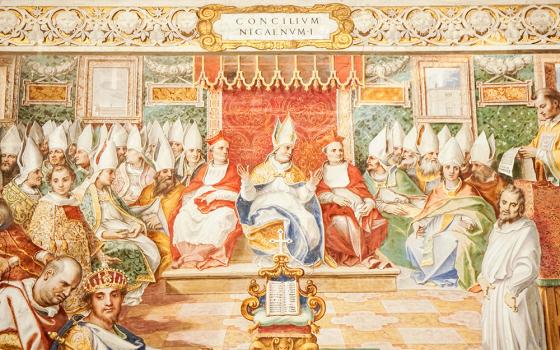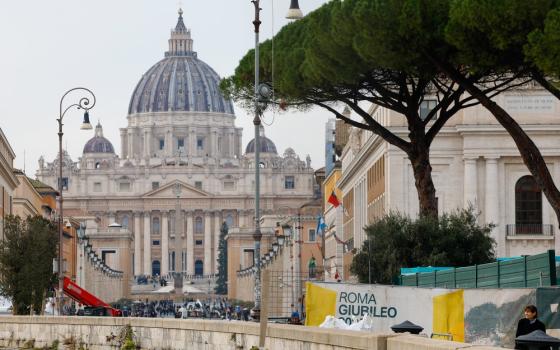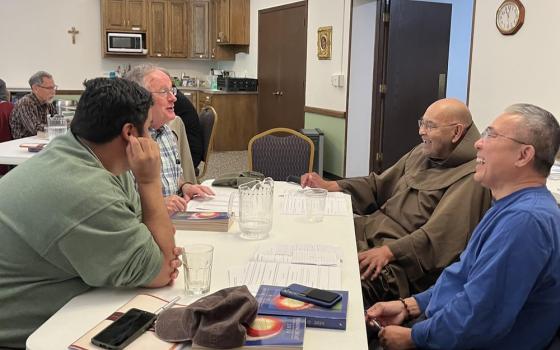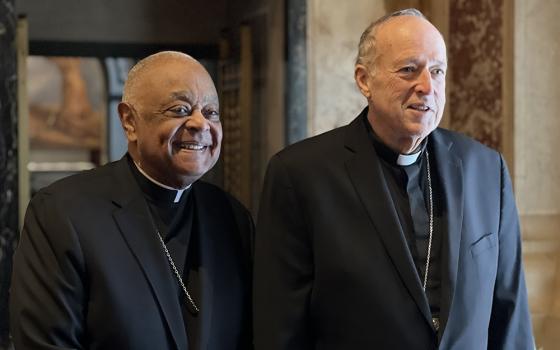Pope Francis leads a consistory for the creation of 20 new cardinals in St. Peter's Basilica at the Vatican Aug. 27. (CNS/Paul Haring)
If there is one overarching theme to NCR's top 10 news stories for 2022, it is calls for change in the Catholic Church. And even though these calls aren't new ones, there is a lot of hope that Pope Francis' synod on synodality will lead to transformation.
But amid that hope is an undercurrent of opposition to Francis and his slow, but steady shifts. The tension between the political left and right in the United States seems to have bled into the hierarchy of the Catholic Church.
The top 10 most read news stories on NCR's website for 2022 focus on new cardinal electors, including a vocal champion of Francis; the pope's response to the war in Ukraine; trouble in Word on Fire's workplace; and attitudes toward LGBTQ Catholics.
These were NCR's most read — not necessarily the most important — news stories of the year. They are listed in order by the number of website visitors who read the story, with short summaries of their contents. We'll post a separate article about our most read opinion and commentary pieces later this week.
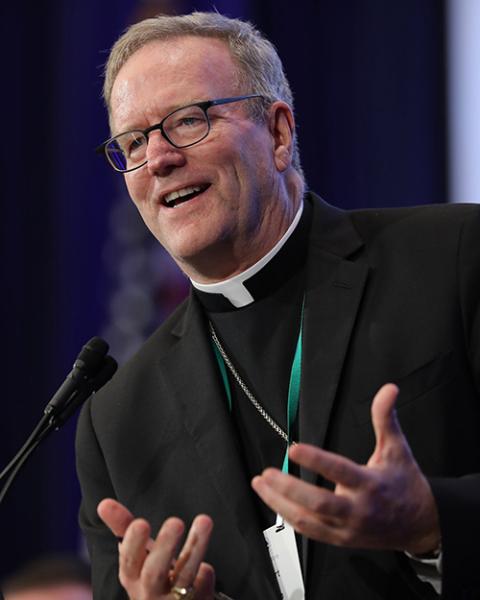
Los Angeles Auxiliary Bishop Robert Barron, founder of Word on Fire Catholic Ministries, speaks during the fall general assembly of the U.S. Conference of Catholic Bishops in Baltimore Nov. 11, 2019. (CNS/Bob Roller)
1. Multiple resignations at Bishop Barron's Word on Fire after allegations into staffer's personal life
On June 1, after weeks of investigation, we published a story about the tarnished image of multimedia nonprofit Word on Fire, and that of founder Bishop Robert Barron, amid the organization's handling of allegations of sexual misconduct outside the workplace against a former employee.
Frustrated by poor communication and a workplace culture they said has been warped by secrecy and hypermasculinity, at least a half-dozen Word on Fire employees resigned from the Catholic outlet.
Those who remain at the Illinois-based multimedia nonprofit are working in an environment that a few recently departed workers described to NCR as beset by low morale, damaged trust and a "boys' club" culture that made some female employees uncomfortable and others unwilling to raise concerns to leadership.
On June 2, the Vatican announced that Barron was appointed to lead the Diocese of Winona–Rochester in Minnesota.
2. Pope Francis tells parents not to condemn children with different sexual orientations
Pope Francis on Jan. 26 told parents not to condemn children who have different sexual orientations.
"Never condemn your children," said Francis, who said that parents should accompany such children and "not hide behind an attitude of condemnation."
The pope's unscripted remarks came during his weekly general audience and offer yet another example of his delicate tightrope walk of affirming church teaching when it comes to homosexuality and trying to extend a warmer welcome to LGBTQ people
The TikTok we posted with this news is our most popular to-date, with almost 850,000 views.
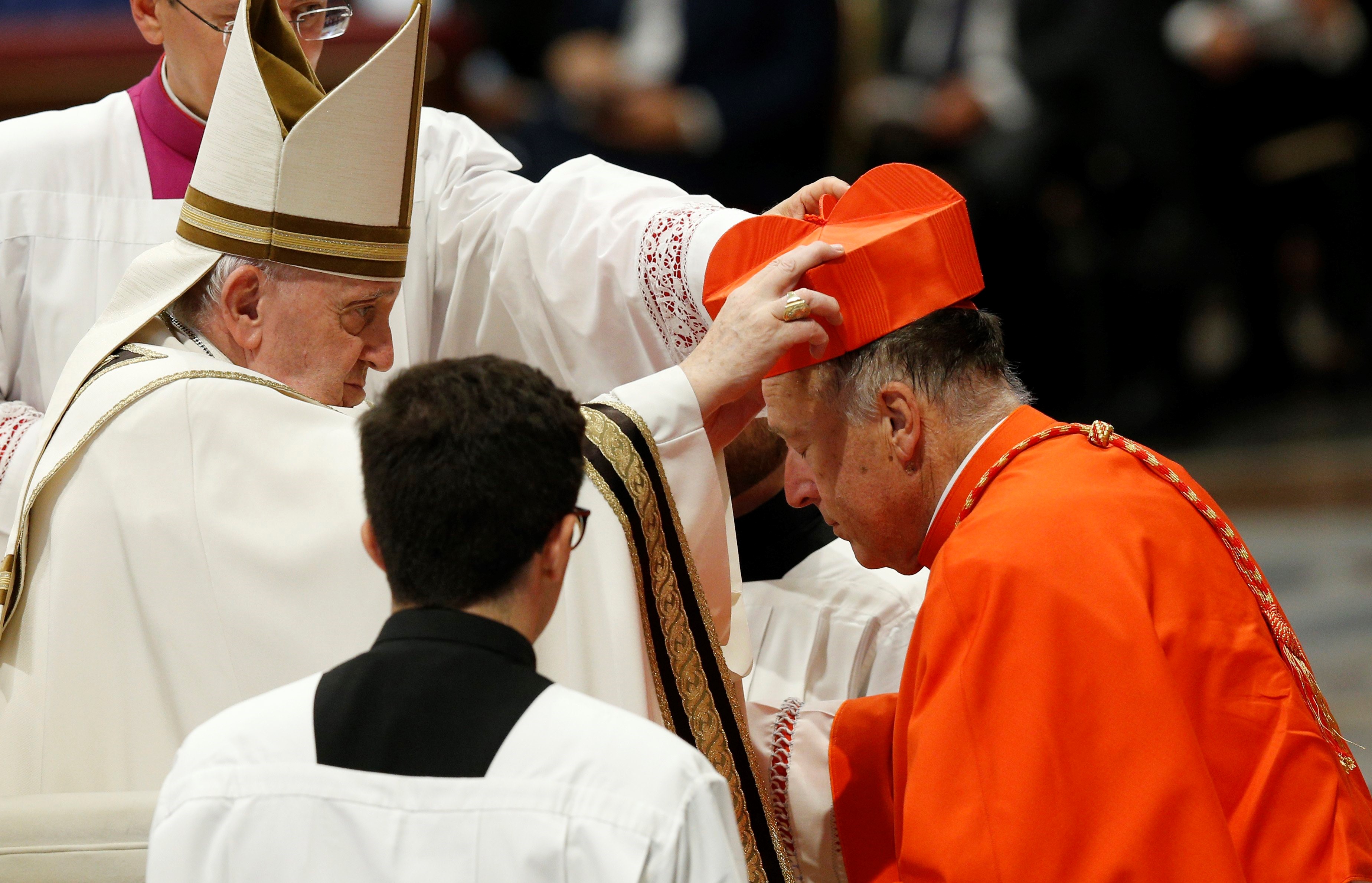
Pope Francis places a red biretta on new U.S. Cardinal Robert W. McElroy of San Diego during a consistory for the creation of 20 new cardinals in St. Peter's Basilica at the Vatican Aug. 27. (CNS/Paul Haring)
3. Pope Francis names 16 new cardinal electors, including San Diego's Bishop McElroy
Pope Francis on May 29 named 16 new cardinal electors, including Bishop Robert McElroy of San Diego, California, along with three Vatican officials and a number of bishops from the Global South.
McElroy, who was made an auxiliary bishop of San Francisco in 2010 and then named bishop of San Diego by Pope Francis in 2015, is the first cardinal for the Diocese of San Diego. He has been among the most vocal champions of Pope Francis' pastoral agenda among the U.S. hierarchy, frequently echoing the pope's prioritization of environmental concerns, migration and a more welcoming approach to LGBTQ people.
At the Aug. 27 consistory, Francis asked the new cardinals to use an "unassuming power" and preach the Gospel with an openness to all people "without exception."
Dublin Archbishop Dermot Farrell receives his pallium from Archbishop Jude Thaddeus Okolo, papal nuncio, center, at St. Mary's Pro Cathedral in Dublin Aug. 7, 2021. (CNS photo/courtesy John McElroy)
4. Dublin archbishop: 'Radical change is coming in the church'
After a year at the head of the Dublin Archdiocese, Archbishop Dermot Farrell said, "Radical change is coming in the church," which will see a renewal of energy and new forms of ministry.
"With a powerful commitment from clergy and lay faithful, across the full range of the life and ministry of parish communities, we are going to experience a renewal of energy and the adoption of new forms of outreach and ministry," the 67-year-old archbishop told Catholic News Service. He also said he believes change is already happening in the church's structures all over the Western world.
"Pope Francis is offering us a way of being church, the synodal pathway, of walking together more closely and being a church that is hope-filled, despite many challenges," he said.
5. Pope to consecrate Russia, Ukraine to Mary
The Vatican announced March 15 that Pope Francis would consecrate Russia and Ukraine to the Immaculate Heart of Mary during a penitential prayer service in St. Peter's Basilica March 25. And a few days later, Francis asked the world's bishops to join him in the consecration.
At his Sunday recitations of the Angelus since Russia invaded Ukraine Feb. 24, people had been showing up in St. Peter's Square with signs asking the pope for the consecration of Russia or of Russia and Ukraine to Mary.
"Mother of God and our mother, to your Immaculate Heart we solemnly entrust and consecrate ourselves, the church and all humanity, especially Russia and Ukraine," the pope said March 25, pronouncing the Act of Consecration after leading a Lenten penance service in St. Peter's Basilica.
Cardinal Jean-Claude Hollerich of Luxembourg, president of the Commission of the Bishops' Conferences of the European Union, is pictured in a Feb. 16, 2020, photo. (CNS photo/Stefano Dal Pozzolo, KNA)
6. Top EU cardinal calls for change in church teaching on gay relationships
Luxembourg Cardinal Jean-Claude Hollerich, a Jesuit who leads the Commission of the Bishops' Conferences of the European Union (COMECE), called for a change in the church's teaching on homosexuality. In a February interview with Germany's Catholic News Agency (KNA), he said he considered the church's assessment of homosexuality relationships as sinful to be wrong.
"I believe that the sociological-scientific foundation of this teaching is no longer correct," Hollerich said. The cardinal said it was time for a fundamental revision of church teaching, and suggested the way Pope Francis had spoken about homosexuality in the past could lead to a change in doctrine.
Hollerich made his comments in response to the public campaign by 125 Catholic Church employees in Germany who recently outed themselves as queer, saying they want to "live openly without fear" in the church.
7. After 9 years, Francis reorganizes Vatican with focus on evangelization, roles for laypeople
Pope Francis overhauled the Vatican's central bureaucracy for the first time in over 30 years, dramatically expanding the number of top leadership roles lay men and women can hold and reorganizing Vatican departments under the central priority of evangelization.
The 54-page text of the new Apostolic Constitution was released on March 19 — nine years to the day of Francis' inauguration as pope in 2013 — and fulfills a top priority of the College of Cardinals, who made clear their desire to improve and decentralize church governance when they gathered in Rome to name a successor to the then-recently retired Pope Benedict XVI.
Under the title of Praedicate Evangelium ("Preach the Gospel"), the new document stresses that evangelization is the central task of the church.
8. Cardinal Ouellet: Priests not supporting Francis should ask, 'What am I doing here?'
In February, Canadian Cardinal Marc Ouellet presided over a three-day international symposium on the priesthood at the Vatican. The conference brought together a range of bishops, priests, religious formators and experts from around the world to explore the theological dimensions of the priesthood, including celibacy.
Pope Francis kicked off the conference by upholding clerical celibacy as a "gift" that should be lived out through "healthy relationships."
The timing of the priesthood symposium comes amid another major inflection point in the global Catholic Church: a newly revamped synod process that was launched last October in an effort to create a more participatory, listening church. Ouellet said he doesn't see the priesthood symposium in conflict with the synodal focus of the church, saying that at this moment, the role of the priest is "to really listen."
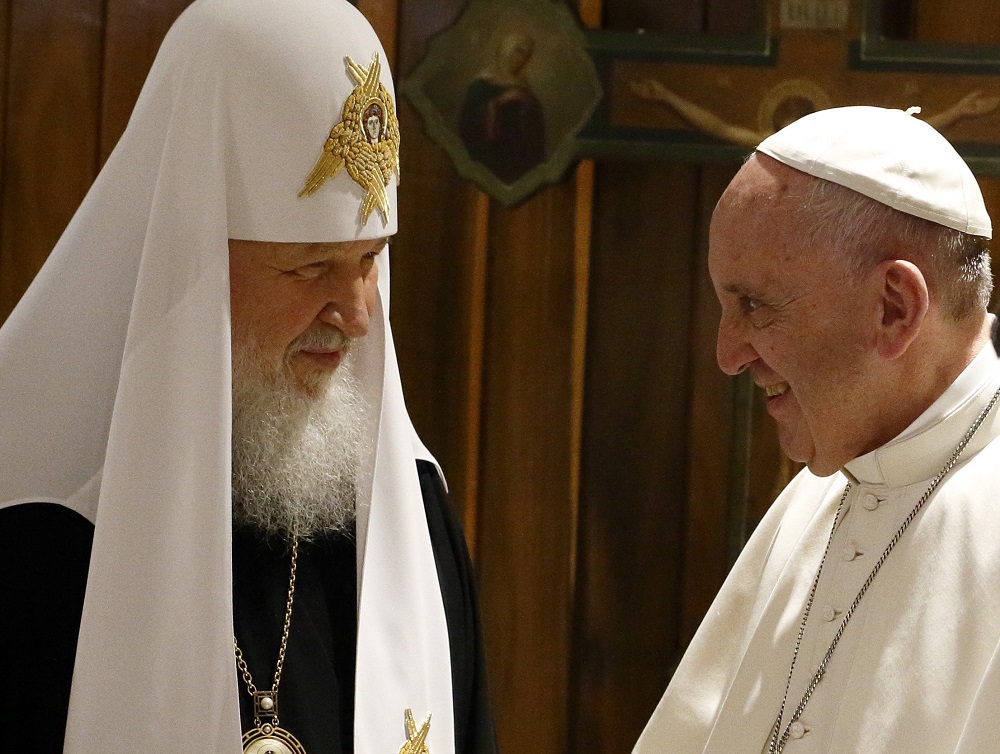
Russian Orthodox Patriarch Kirill of Moscow and Pope Francis smile during a meeting at Jose Marti International Airport in Havana in this Feb. 12, 2016, photo. According to a statement released by the Moscow Patriarchate March 16, Pope Francis spoke via video conference with Patriarch Kirill about the ongoing crisis in Ukraine and the hopes of peaceful solution. (CNS/Paul Haring)
9. Pope Francis in video conference with Russian Patriarch Kirill rejects religious defense of invasion
Pope Francis on March 16 spoke by video conference with Russian Orthodox Patriarch Kirill, a key backer of Russian President Vladimir Putin's war against Ukraine. In the call, the two religious leaders pledged their respective commitments to securing peace.
A Vatican communique stated that Francis rejected the justifications for the invasion as a "holy war," saying "today we cannot speak like this."
"Christian awareness of the importance of peace has developed," said Francis. Kirill had previously used religious language to justify his support for Russia's military aggression.
Our continuing coverage of the war in Ukraine can be found here.
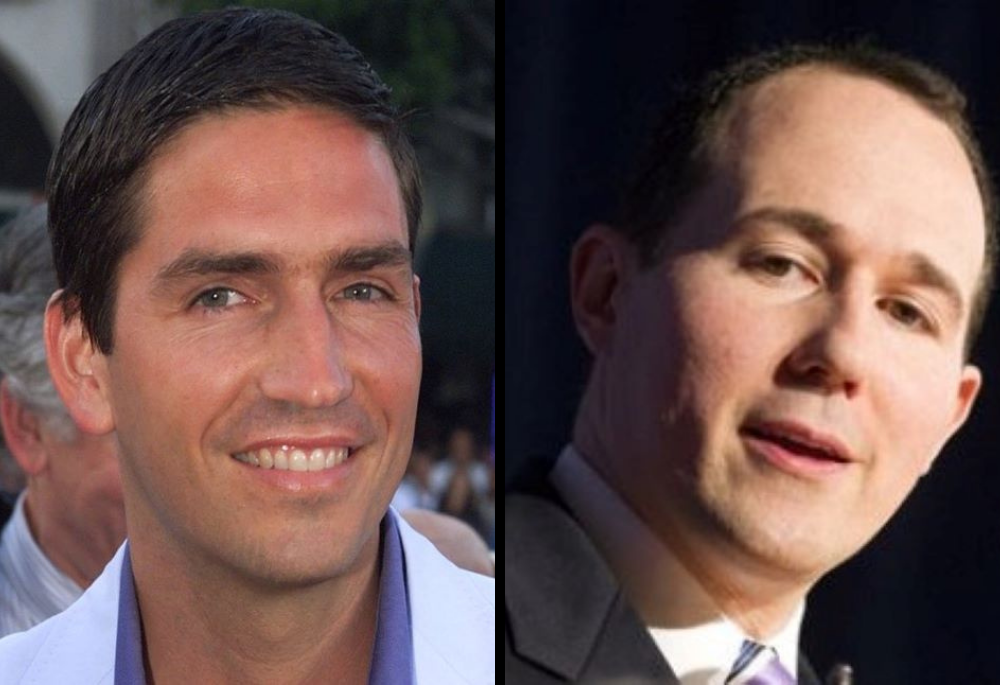
Jim Caviezel, left, appears in a 2003 file photo for the film "The Passion of the Christ." Raymond Arroyo, EWTN anchor and frequent Fox News contributor, appears in a 2013 file photo taken at the National Religious Freedom Conference in Washington. Caviezel and Arroyo are headline speakers at the April 2 Cincinnati Men's Conference. (CNS/Reuters, CNS/Nancy Phelan Wiechec)
10. Cincinnati archdiocese withdraws support of event featuring Arroyo, Caviezel
A Kentucky bishop withdrew from the speaker lineup of a Catholic men's conference in Cincinnati that the local archdiocese did not sponsor or participate in because of the "significant baggage" of its featured speakers, which included EWTN anchor Raymond Arroyo and "Passion of the Christ" actor Jim Caviezel.
The Cincinnati Men's Conference, which was scheduled for April 2 at the University of Cincinnati Campus' Fifth Third Arena, advertised Arroyo, a frequent Fox News contributor, and Caviezel, who earlier spoke at a QAnon conference in Las Vegas, as its "headline speakers."
On Jan. 3, the Archdiocese of Cincinnati emailed local clergy to inform them that the archdiocese would "not be sponsoring, promoting or participating" in this year's conference because of its opposition "to attempts by either the right or the left to divide the Catholic Church by political position."

